仁爱英语八年级上U1T2SB教学案
- 格式:doc
- 大小:194.00 KB
- 文档页数:4
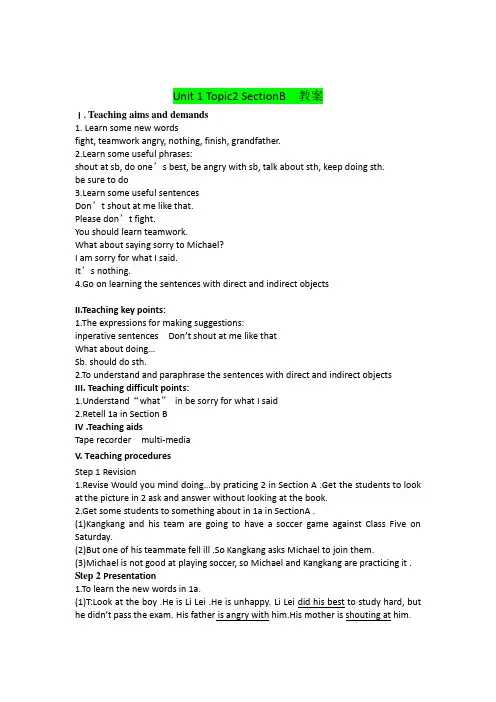
Unit 1 Topic2 SectionB 教案Ⅰ. Teaching aims and demands1. Learn some new wordsfight, teamwork angry, nothing, finish, grandfather.2.Learn some useful phrases:shout at sb, do one’s best, be angry with sb, talk about sth, keep doing sth.be sure to do3.Learn some useful sentencesDon’t shout at me like that.Please don’t fight.You should learn teamwork.What about saying sorry to Michael?I am sorry for what I said.It’s nothing.4.Go on learning the sentences with direct and indirect objectsII.Teaching key points:1.The expressions for making suggestions:inperative sentences Don’t shout at me like thatWhat about doing…Sb. should do sth.2.To understand and paraphrase the sentences with direct and indirect objectsIII. Teaching difficult points:1.Understand“what”in be sorry for what I said2.Retell 1a in Section BIV .Teaching aidsTape recorder multi-mediaV. Teaching proceduresStep 1 Revision1.Revise Would you mind doing…by praticing 2 in Section A .Get the students to look at the picture in 2 ask and answer without looking at the book.2.Get some students to something about in 1a in SectionA .(1)Kangkang and his team are going to have a soccer game against Class Five on Saturday.(2)But one of his teammate fell ill .So Kangkang asks Michael to join them.(3)Michael is not good at playing soccer, so Michael and Kangkang are practicing it . Step 2 Presentation1.To learn the new words in 1a.(1)T:Look at the boy .He is Li Lei .He is unhappy. Li Lei did his best to study hard, but he did n’t pass the exam. His father is angry with him.His mother is shouting at him.(2)T:Now look at the picture in 1a .What are kangkang and Michael doing?Ss:They are fighting .T:Can you guess why they are fighting .S1:I think they didn’t win the game.T:ok,let’s listen to 1a and find the answer.2.Listen to 1a and check the answer.3.Get the students to read the statements in 1b and predict whether they are true and false.Then finish 1b.Step 3 Consolidation1Listen to 1a and read after the recording,pay attention to the pronunciation.2.Read an act out the dialogue.3.Get the students to find out the key points(1)shout at(2)Please don’t fight(3)do one’s best(4)You should learn teamwork(5)be angry with(6)What about saying sorry to Michael.(7)-I’m sorry for what I said .-It’s noting(8)keep trying .(9)be sure to do sth.(10)talk about(11)with the help of(12)have fun4.Finish 1c and retellStep 4 Practice1.Finish2.2.Finish3. Teacher lets the students observe the structure of the example and paraphrase the sentences in 3.3.Ask students to read 4a word by word. Teacher shows phonetic cards/e/ and /ai/. Ask the students to read /e/ and /ai/ one by one.4.Read 3bStep 5 Project1.sum upPhrases and sentences(1)shout at(2)Please don’t fight(3)do one’s best(4)You should learn teamwork(5)be angry with(6)What about saying sorry to Michael.(7)-I’m sorry for what I said .-It’s noting(8)keep trying .(9)be sure to do sth.(10)talk about(11)with the help of(12)have funthe sentences with direct and indirect objects 2.Homework(1)Finish exercise in the workbook(2)Retell 1a .Writing。
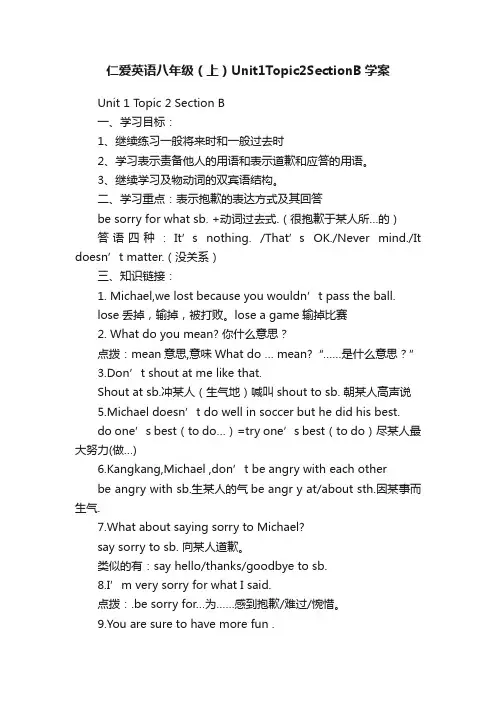
仁爱英语八年级(上)Unit1Topic2SectionB学案Unit 1 Topic 2 Section B一、学习目标:1、继续练习一般将来时和一般过去时2、学习表示责备他人的用语和表示道歉和应答的用语。
3、继续学习及物动词的双宾语结构。
二、学习重点:表示抱歉的表达方式及其回答be sorry for what sb. +动词过去式.(很抱歉于某人所…的)答语四种:It’s nothing. /That’s OK./Never mind./It doesn’t matter.(没关系)三、知识链接:1. Michael,we lost because you wouldn’t pass the ball.lose丢掉,输掉,被打败。
lose a game输掉比赛2. What do you mean? 你什么意思?点拨:mean意思,意味What do … mean?“……是什么意思?”3.Don’t shout at me like t hat.Shout at sb.冲某人(生气地)喊叫shout to sb. 朝某人高声说5.Michael doesn’t do well in soccer but he did his best.do one’s best(to do…)=try one’s best(to do)尽某人最大努力(做…)6.Kangkang,Michael ,don’t be angry with each otherbe angry with sb.生某人的气be angr y at/about sth.因某事而生气.7.What about saying sorry to Michael?say sorry to sb. 向某人道歉。
类似的有:say hello/thanks/goodbye to sb.8.I’m very sorry for what I said.点拨:.be sorry for…为……感到抱歉/难过/惋惜。
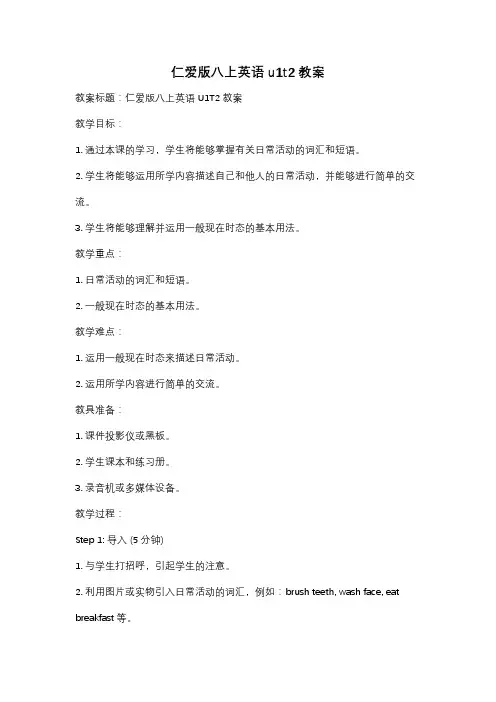
仁爱版八上英语u1t2教案教案标题:仁爱版八上英语U1T2教案教学目标:1. 通过本课的学习,学生将能够掌握有关日常活动的词汇和短语。
2. 学生将能够运用所学内容描述自己和他人的日常活动,并能够进行简单的交流。
3. 学生将能够理解并运用一般现在时态的基本用法。
教学重点:1. 日常活动的词汇和短语。
2. 一般现在时态的基本用法。
教学难点:1. 运用一般现在时态来描述日常活动。
2. 运用所学内容进行简单的交流。
教具准备:1. 课件投影仪或黑板。
2. 学生课本和练习册。
3. 录音机或多媒体设备。
教学过程:Step 1: 导入 (5分钟)1. 与学生打招呼,引起学生的注意。
2. 利用图片或实物引入日常活动的词汇,例如:brush teeth, wash face, eat breakfast等。
Step 2: 新知呈现 (10分钟)1. 使用课件或黑板展示日常活动的词汇,并教授正确的发音和拼写。
2. 通过图片或实物展示日常活动的短语,例如:get up, go to school, do homework等,并进行示范和操练。
Step 3: 情景对话 (15分钟)1. 分角色进行情景对话练习,例如:A:What time do you get up? B:I get up at 7 o'clock.2. 引导学生使用所学词汇和短语进行日常活动的对话练习,例如:A:What do you do after school? B:I do my homework.Step 4: 听力训练 (10分钟)1. 播放录音或展示相关短语和句子的语音模型。
2. 学生跟读并模仿语音模型,逐步提高听力和口语表达能力。
Step 5: 巩固练习 (15分钟)1. 学生个体或小组完成课本和练习册上的相关练习题。
2. 教师巡回指导,关注学生的学习情况,及时纠正错误。
Step 6: 拓展活动 (10分钟)1. 学生分组进行小组活动,描述自己和他人的日常活动。
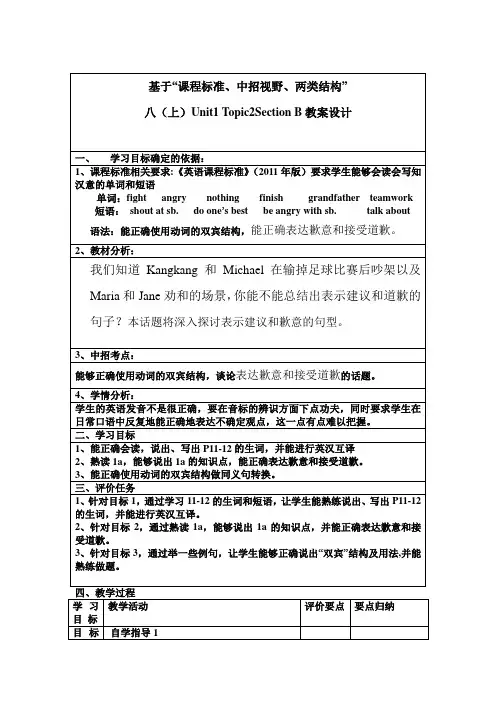
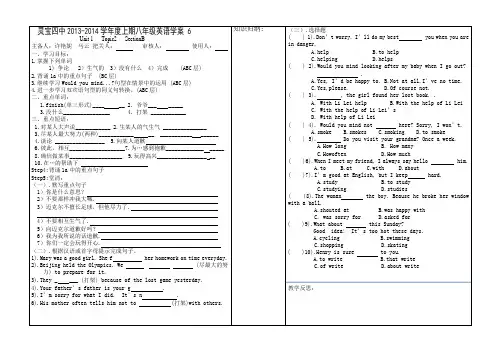
灵宝四中2013-2014学年度上期八年级英语学案 6Unit 1 Topic2 SectionB主备人:许艳妮马云把关人:审核人:使用人:一、学习目标:1.掌握下列单词1) 争论 2)生气的 3)没有什么 4)完成 (ABC层)2.背诵1a中的重点句子 (BC层)3.继续学习Would you mind...?句型在情景中的运用 (ABC层)4.进一步学习双宾语句型的同义句转换。
(ABC层)二、重点单词:1.finish(单三形式)____ __2. 爷爷___ _____3.没什么________________4. 打架 ____________三、重点短语:1.对某人大声说____________2.生某人的气生气 _______________3.尽某人最大努力(两种)____________ __ ___________ ______4.谈论 _________________5.向某人道歉6.彼此,相互___________________7.为…感到抱歉_____________ _____8.确信做某事__________________9.玩得高兴_________________ __ 10.在…的帮助下Step4:背诵1a中的重点句子Step5:堂清:(一).默写重点句子1)你是什么意思?2)不要那样冲我大喊.3)迈克尔不擅长足球,但他尽力了.4)不要相互生气了.5)向迈克尔道歉好吗?6)我为我所说的话道歉.7)你们一定会玩得开心. (二).根据汉语或首字母提示完成句子。
1).Mary was a good girl. She f her homework on time everyday.2).Beijing held the Olympics. We (尽最大的努力) to prepare for it.3).They _ ___ (打架) because of the lost game yesterday.4).Your father’s father is your g .5).I’m sorry for what I did. It’s n .6).His mother often tells him not to (打架)with others.知识归纳:(三).选择题( ) 1).Don’t worry. I’ll do my best you when you arein danger.A.helpB.to helpC.helpingD.helps( ) 2).Would you mind looking after my baby when I go out?.A.Yes, I’d be happy to.B.Not at all.I’ve no time.C.Yes,please.D.Of course not.( ) 3). , the girl found her lost book. .A.With Li Lei helpB.With the help of Li LeiC. With the help of Li Lei’sD. With help of Li Lei( ) 4). Would you mind not here? Sorry, I won’t.A.smokeB.smokesC.smokingD.to smoke( ) 5). Do you visit your grandma? Once a week.A.How longB. How manyC.HowoftenD.How much( )6).When I meet my friend, I always say hello him.A.toB.atC.withD.about( )7).I’m good at English, but I keep hard.A.studyB.to studyC.studyingD.studies( )8).The woman the boy. Beause he broke her windowwith a ball.A.shouted atB.was happy withC. was sorry forD.asked for( )9).What about this Sunday?Good idea! It’s too hot these days.A.cyclingB.swimmingC.shoppingD.skating( )10).Henry is sure to you.A.to writeB.that writeC.of writeD.about write教学反思:。
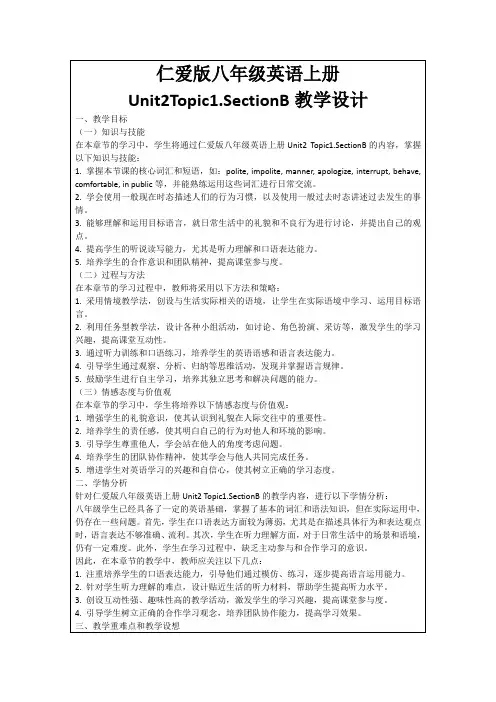
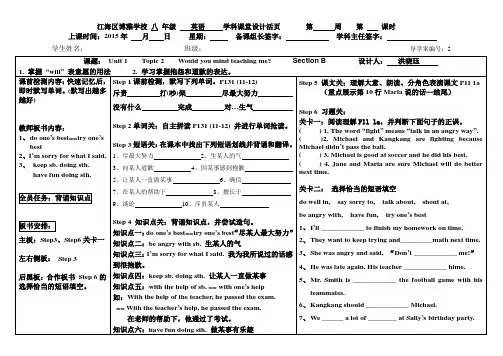
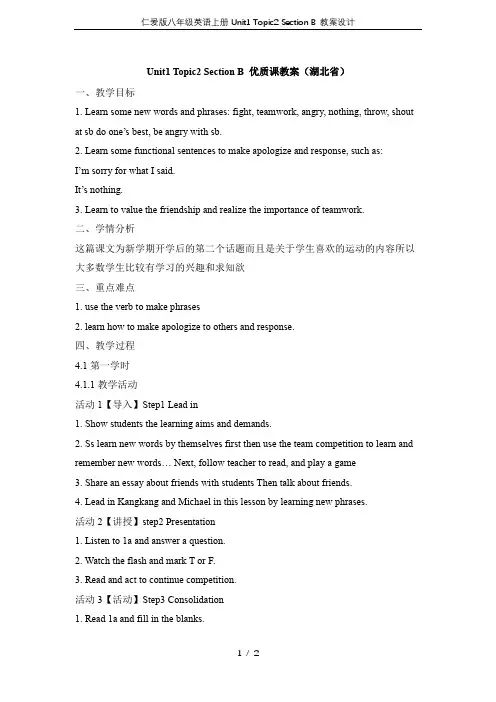
Unit1 Topic2 Section B 优质课教案(湖北省)一、教学目标1. Learn some new words and phrases: fight, teamwork, angry, nothing, throw, shout at sb do one’s best, be angry with sb.2. Learn some functional sentences to make apologize and response, such as:I’m sorry for what I said.It’s nothing.3. Learn to value the friendship and realize the importance of teamwork.二、学情分析这篇课文为新学期开学后的第二个话题而且是关于学生喜欢的运动的内容所以大多数学生比较有学习的兴趣和求知欲三、重点难点1. use the verb to make phrases2. learn how to make apologize to others and response.四、教学过程4.1第一学时4.1.1教学活动活动1【导入】Step1 Lead in1. Show students the learning aims and demands.2. Ss learn new words by themselves first then use the team competition to learn and remember new words… Next, follow teacher to read, and play a game3. Share an essay about friends with students Then talk about friends.4. Lead in Kangkang and Michael in this lesson by learning new phrases.活动2【讲授】step2 Presentation1. Listen to 1a and answer a question.2. Watch the flash and mark T or F.3. Read and act to continue competition.活动3【活动】Step3 Consolidation1. Read 1a and fill in the blanks.2. Then retell the story after some key words.3. Enjoy a beautiful song about friendship to realize we should value our friends.活动4【练习】Step4 Summary1. Review the words and phrases Ss have learned today.2. Sum the results of compition. Prize the winner team.。
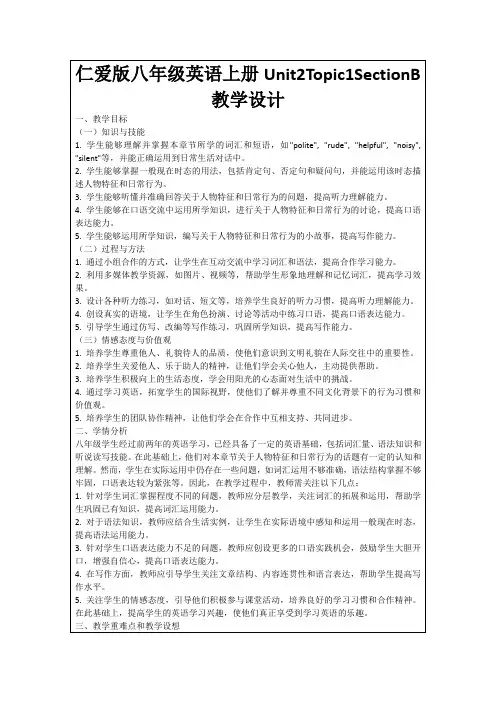
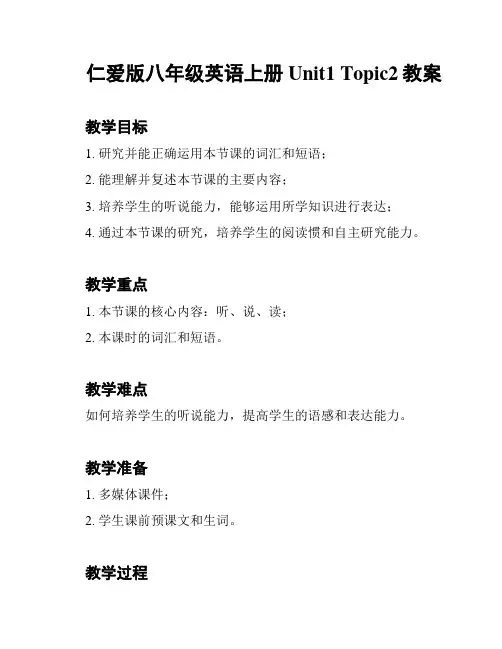
仁爱版八年级英语上册Unit1 Topic2教案
教学目标
1. 研究并能正确运用本节课的词汇和短语;
2. 能理解并复述本节课的主要内容;
3. 培养学生的听说能力,能够运用所学知识进行表达;
4. 通过本节课的研究,培养学生的阅读惯和自主研究能力。
教学重点
1. 本节课的核心内容:听、说、读;
2. 本课时的词汇和短语。
教学难点
如何培养学生的听说能力,提高学生的语感和表达能力。
教学准备
1. 多媒体课件;
2. 学生课前预课文和生词。
教学过程
课堂作业
1. 利用本节课研究到的词汇和短语,写一篇生活情景的短文,
体现生词和短语的使用;
2. 记录当天课程中不懂的问题,并在下节课之前解决。
教学反思
本节课通过听、说、读的方式,使学生在实际操作中掌握知识点,并能运用所学知识进行表达。
同时,教师注意问题引导和解决,提醒学生注意在课外练习中巩固所学知识点,提高个人语感和表达
能力。
未来需要注重提高学生阅读理解能力及文化素养,并注重培
养学生的创新思维和实践能力。
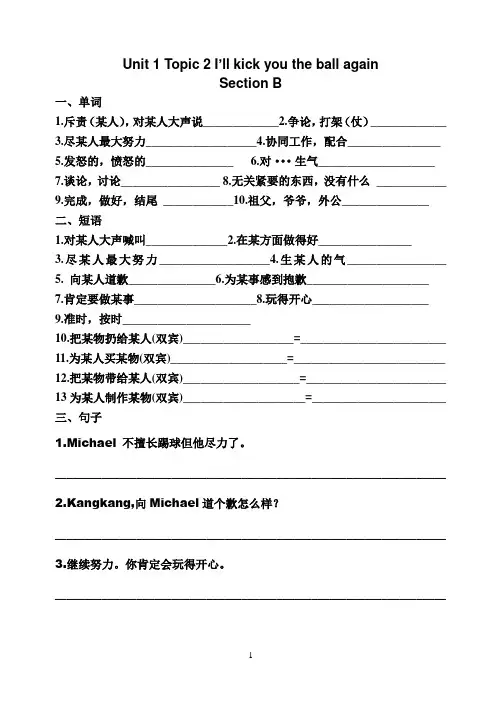
Unit 1 Topic 2 I’ll kick you the ball againSection B一、单词1.斥责(某人),对某人大声说_____________2.争论,打架(仗)_____________3.尽某人最大努力___________________4.协同工作,配合________________5.发怒的,愤怒的_______________6.对···生气____________________7.谈论,讨论_________________8.无关紧要的东西,没有什么____________9.完成,做好,结尾____________10.祖父,爷爷,外公_______________二、短语1.对某人大声喊叫______________2.在某方面做得好________________3.尽某人最大努力___________________4.生某人的气_________________5. 向某人道歉_______________6.为某事感到抱歉_____________________7.肯定要做某事_____________________8.玩得开心____________________9.准时,按时______________________10.把某物扔给某人(双宾)___________________=_________________________11.为某人买某物(双宾)____________________=__________________________12.把某物带给某人(双宾)____________________=________________________ 13为某人制作某物(双宾)_____________________=_______________________三、句子1.Michael 不擅长踢球但他尽力了。
一、知识目标【重点词组】have a soccer game进行一场足球赛fall ill病倒了be a little far from… 离……有点远miss a good chance错过一个好机会get/miss a goal得到/失去一分shame on sb.为某人感到羞耻do one’s best尽某人的力say sorry to sb.对某人说抱歉be sure to do sth确定做某事be angry with sb.生某人的气with one’s he lp = with the help of sb. 在某人的帮助下serve food上菜turn up/down…调高/低(音量)keep sb. doing sth.让某人一直做某事in a minute 一分钟后;马上on the phone = over the phone在电话中take a seat =sit down就坐never mind不要紧a lot of traveling一系列旅行love/enjoy doing sth.喜爱/欢做某事have a very exciting life过着非常兴奋的生活as well 也(放句末)throw…into…把……投进……follow/obey the rules遵守规则more and more people 越来越多的人feel tired感到疲劳instead of…替代……ask sb. to do sth.叫某人做某事make a plan for sb.为某人订一份计划build up增进;增强have fun doing sth.乐于做…..做某事be important to sb 对于某人来说是重要in a minute/ at once/ right away立刻/马上【重点句型】1.Could you please do me a favor? = Could you help me? = Could you give me ahand? 你能帮我吗?2.Would you mind teaching me? = Would you please teach me? 你教我好吗?3.Would you mind not smoking here ? 你不要在这里抽烟好吗?4.You are always so careless. 你总是这样粗心大意.5.I’m very sorry for what I said. 我为所说感到到道歉。
八年级上册Unit 1 Topic 2 I’ll kick you the ball again.Section B【教学构思】一、教材分析:本课属于课标话题人与社会——“文娱与体育(Recreation and sports)”中体育与赛事(sports and matches)项目,主要谈论Kangkang和Michael在输掉足球赛后吵架以及Maria和Jane 劝和的场景。
本课属于课标功能意念表“社会交往(Social communications)”中建议(Suggestions)和道歉(Apologies)项目,主要学习表示建议和道歉的功能句。
主要教学活动为1a和4a,4b。
通过Maria和Jane平息Kangkang和Michael的争吵,呈现了对话的主题是:One player doesn’t make a team. 对话呈现了提建议的三种方式:(1)祈使句的肯定句、否定句形式;(2)What about doing sth.?(3)sb. should do sth.。
语音学习:(1)让学生区分元音/ e /和/ aɪ /发音的不同,并能掌握各自的拼写规则。
(2)让学生体会清辅音的不完全爆破并能正确朗读。
本课帮助学生学会请求、提建议、道歉的表达法,通过和他人的沟通、合作,将团队合作精神融于对话中,并能将团队合作精神体现在书面表达中。
二、设计说明:根据学情和本课的语法及话题,本节课的教学设计将听与说相结合,以1a为载体,立足话题,聚焦功能句型,通过听说练习和思维导图内化知识;在语言生成阶段,循序渐进,通过同伴合作完成学习任务。
本课在重、难点突破的方法上有所创新,教师通过设计group work,引导学生感知本课重点句型,接着通过短文写作,团队合作精神融于书面表达中,达到学以致用。
【教学目标】1.能听懂有关体育活动中团队合作的简单对话和陈述,学会以“听”的方式理解语言意义;2.能正确地用英语在团队中提建议、向他人道歉,学会恰当选用交际方式,关注语言得体性;3.能正确朗读课本的文本材料及难度相当的材料,培养良好语感,提升“说”的语言能力;4.能将团队合作精神体现在书面表达中,发展学生多元学习策略,提高“写”的语言能力。
Unit 1 Topic 2 Section B主备:班级:姓名:一、教学目标1.掌握生词和短语:careless, chance, shout at, either, fight, be angry with, do one’s best, nothing, keep doing sth., serve, turn down, dirty, minute, in a minute, ready, another, take a seat2.学会一些常用的句子:(1)What do you mean by saying that?(2)Kangkang, don’t be angry with Michael.(3)Keep trying.(4)We are sure to win next time.3. 学会用will表达意愿:(1)I’ll do it in a minute.(2)It’ll be ready soon.(3)I’ll do it at once.4. 学会表达怨言和道歉:(1)Blame others:①You are always so careless!②You shouldn’t shout at me.(2)Apologies and responses:①—I am very sorry for what I said.—It’s nothing.②—I’m sorry I’m late for class.—That’s OK. Please take a seat.二、教学方案1、复习:请同学们用Do/Would you mind (not) doing sth?句式来进行问答表演,并写出下一些精彩的句子。
2、学习并初步掌握一些生词:粗心的:细心的:一个好机会:对某人大吼:失球:与某人争吵/打架:生某人的气:尽某人最大的努力:没关系:继续努力:3、听1a录音,回答问题:(1) Why was Kangkang angry with Michael?(2) Did Kangkang say sorry to Michael?4、再听1a录音,画出对话中表示抱怨与应答的句子,跟读并模仿语音语调。
UNIT 2 Keeping HealthyTOPIC 1 You should brush your teeth twice a day.Section B教案教学目标:1.通过本课内容的学习,要求学生学会“听说读写”教学大纲中涉及到的词汇,句型和语法知识,并能服务于现实生活,能够运用所学知识了解相关信息。
2.通过分组讨论,编对话,做游戏等课堂教学活动,培养了学生沟通合作的能力。
3.了解在特定语言环境下,如何正确表达,如何关爱他人。
教学重点与难点:What’s the matter/ What’s wrong with him/her?I have a cold./He / She has a cold.You/He/ She should take some medicine.教学过程:Step1 Preparation1. Greetings.2. Recite Part A and C of unit 33. Ask “How are you?” to talk about the healthy.Step 2 Presentation1. Bring in a box of tissues and some medicine in order to lead to the new contents.2. Pretend to feel unwell. Sneeze, blow my nose, take my own temperature, feel my forehead, take some medicine, etc. Ask the pupils who should I see? May be the pupils can answer: a doctor.3. Ask the pupils where does a doctor work? to revise the words clinic and hospital.4. Teach the words medicine, fever, headache, stomachache and a cold. Write on the board what’s the matter? Ask the pupils to ask me the question. Reply I have a fever/ clod/ stomachache/ headache. Ask the pupils, what should I do? Elicit the responses and write them on the board: take some medicine, see a doctor, go to the clinic. Tell the pupils maybe I should have a rest.Demonstrate by putting my head on my arms on the desk. Add have a rest to the phrases on the board.5. Point to the dentist in the picture. Tell the pupils that dentists look after our teeth. Ask the pupils who visits the dentist? Those who visit the dentist should raise their hands.6. Ask the pupils to read the dentist’s advice aloud. Ask the pupils to point to the correct parts of the teeth on the pictures.7. Play the cassette for the pupils and ask them to say the sentences after the speaker.8. Ask the pupils what should we eat? and What shouldn’t we eat?Learn to distinguish healthy food for our teeth.Step 3 Revision1. Show the flashcards, review this unit.2. Have a dictation.3. Show the courseware, ask the pupils to read silently what doctor say.4. Show the pupils the close-up picture of the doctor’s notes. Play the cassette, ask the pupils to read the conversation aloud.5. Check the pupils know what advice the doctor has given. Ask them to write it in the blanks on the doctor’s note. Explain that we often give advice using should and need to.6. Play the cassette again and ask the pupils to check their work.Step 4 Have fun1. Play a guessing game. (look at the teacher’s gesture carefully, and give the correct name of ill. Then invite the other pupils instead of teacher.)2. Read the text together.Homework1. Copy the new words of this unit each four times.2. Finish the exercises in Koko Homework.3. Retell the story to the parents at home.。
八上Unit1 Topic2 I’ll kick you the ball again. 教案一、重点短语&句型fall ill患病,生病mind doing sth介意做某事give sb a hand帮某人一个忙do well in在...方面做得好shout at sb斥责某人,冲某人大喊do/try one’s best尽某人最大努力be angry with sb生某人的气talk about谈论at first起初,起先,在开始come into being形成,产生,成立for example例如二、语法双宾语1.定义:某些及物动词后可以跟两个宾语,即间接宾语和直接宾语,构成双宾语。
其中间接宾语一般是人,是谓语动词的目标(for)和方向(to)直接宾语一般是物,是谓语动词的承受着。
I’ll kick you the ball. = I’ll kick the ball to you.我将把球踢给你。
(kick sb sth = kick sth to sb)主谓间宾直宾主谓直宾间宾2.结构主语+谓语+间接宾语+直接宾语主语+谓语+直接宾语+ to +间接宾语一般翻译成“把某物+谓语动词+给某人”(表示方向性)主语+谓语+直接宾语+ for +间接宾语一般翻译成“为/给某人+谓语动词+某物”(表示目的性)e.g. I pass you the ball. = I pass the ball to you. 我把球传给你。
(pass sb sth = pass sth to sb)e.g. My mother buys me a bag. = My mother buys a bay fo r me. 我妈为/给我买了一个包。
(buy sb sth = buy sth for sb)to连接间接宾语的动词有:pass, give, kick, show, tell, lend, take, bring, return等;for连接间接宾语的动词有:buy, cook, get, sing, make等。
凤阳县城北中学教学案年 科 主 参加集体 陈立军 赵家宽 八年级 英 语 陈立军 目 备 级 备课人员 马 梅 李 莉 内 使用 Unit1 Topic2 Section B 课型 新授课 第 3 周 容 时间 学习目标 知识与能力目标: 学会使用下列句型表示埋怨、道歉及应答: You are always so careless. You miss a good chance. I’m sorry for what I said. I’m sorry I’m late for class. Never mind./ It doesn’t matter./That’s OK./That’s all right. 过程与方法目标:讨论,探究 情感态度与价值观目标: 通过学习,在日常生活中养成讲文明、有礼貌的优秀品德。
重点:表示埋怨、道歉及应答的句型 难点: 学习过程: 学前准备 一.学前准备 1、试一试根据音标拼读生词和短语,并结合课本在对话中划出这些词语,结合 课本对话理解其含义: careless, chance, shout at, goal, either, fight, angry, be angry with, do one’s best, nothing, keep doing sth. Serve, turn down, minute, in a minute, dirty, ready, clearly, another, take a seat. 2、预习课文翻译下列词组: (1)错过一个好机会______________(2)尽某人的力____________________ (3)对某人说抱歉________________(4)生某人的气____________________ (5)在某人的帮助下______________(6)马上,立刻____________________ (7)坚持努力____________________(8)失分/失球 ____________________ (9)be sure to do sth ______________(10)serve food ___________________ (11)turn up/down… ______________(12)keep sb. doing sth. ______________ (13)in a minute _________________ (14) on the phone __________________ (15)take a seat __________________ (16) never mind ____________________ 3、重点语言点导学 1. ill 与 sick 都表示 “生病的”, 只能作表语而既可作表语也可作定语. 如: 那个男人病了. (作表语) _____________________________________ 他是个病人. (作定语) ______________________________________ 第 1 页2.What do you mean by doing sth? 你……是什么意思? 你嘲笑我是什么意思?______________________________________________ 3. Would you mind (not) doing sth? 表示 “(不)做某事介意/好吗?” 如: 您介意来修理它? _________________________________________________ 不要在这儿吸烟好/介意吗? ________________________________________ 4. one of + 名词复数 表示 “其中之一……”, 主语是 one,表单数. 如: ____ _____ ______ _____ is strong and tall. 其中我的一个队友又高又壮。
____ _____ ______ _____ likes English 其中我的一个朋友喜欢英语。
5. miss “错过,思念,遗失” 如: 昨天我错过最后一班车.I ______ _____ ______ ________yesterday. 他想念他的母亲. __________________________________________. 天啊! 我把钥匙弄丢了.My God! I _______ my key.. 6. be sure to do sth. = be sure that + 句子 “确定做某事” 如: 我们确信下次一定会赢。
__________________________________________________. __________________________________________________. 7. be sorry for… “为某事抱歉” be sorry to do sth. = be sorry (that) + 句子 “很抱歉做了某事” 如: 我为我所说的话感到抱歉 I _________ _______ ______ what I said.. 我很抱歉弄丢你的书。
________________________________________. 师生互动, 二、师生互动,探究新知 1、复习导入 复习提出请求的句型: Could you please open the window? Sure./ Certainly./ Of course./All right./Yes.I’ll be glad to. Would you mind opening the door? Not at all./ Certainly not./ Of course not. 告诉学生 This class,we are going to learn how to make comlains and apologies. (如何表示抱怨和道歉) 2、学习 1a (1)听 1a 录音,回答问题 What’s wrong with Michael? __________________________________ What did Kangkang do? _______________________________ (2)讨论并掌握重点词组及句型和如何表示抱怨和道歉: You are always so careless. What do you mean by doing sth? You miss a good chance. 第 2 页I’m sorry for what I said. It’s nothing/ Never mind./ It doesn’t matter./That’s OK./That’s all right. be angry with bay sorry to sb. keep trying Be sure to do sth. (3).四人一组练习对话,然后完成 1b 2、两人一组补全对话,找出重点词语,然后练习对话。
重点词语: server the food turn down the music in a miute keep me waiting a long time hear clearly 3、练习道歉和应答,把 3 中的道歉和相应的答语连接起来,然后两人一组练习 对话。
三、拓展与提高1、试试看,你能选出最佳答案吗? ( ) 1. I have two friends. One is from China, is from Canada. A. other B. another C. the other ( ) 2. . –Do you mind my smoking here? A. Yes, you can B. Yes, I do C. No. you’d better not ( ) 3. ---Would you mind ______ the window? ---Certainly not, please do. A. close B. to close C. closing ( ) 4. . ---I want to buy ______. Would you like to go with me? ---Sure. A. something else B. else something C. anything else ( ) 5. He is very . He does everything very well. A. carefully B. careful C. careless ( ) 6. Let’s practice basketball on the playground. A. play B. to play C. playing ( ) 7. She is girl, but she can speak English pretty well. A. a 15-year-old B. a 15 years old C. a 15-years-old ( ) 8. Your father is sleeping. Please the radio a little. A. turn on B. turn up C. turn off D. turn down ( )9. I don’t like football. My brother doesn’t like it, _________. A. too B. also C. either ( ) 10. Liu Xiang is one of the most famous _______ in China. A. runner B. runners C. player 第 3 页2、遣词造句:1. be going to2. make, strong3. turn down___________________________________________________________4. would you mind not ….. ______________________________5. There be, next weekend ______________________________四、课后复习与家庭作业① 复习课本 Section B. ② 预习 SectionC,并完成 SectionC 的教学案。